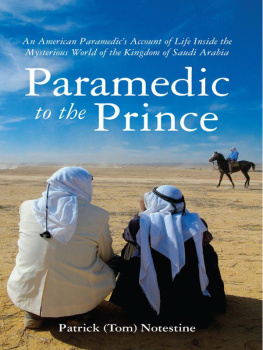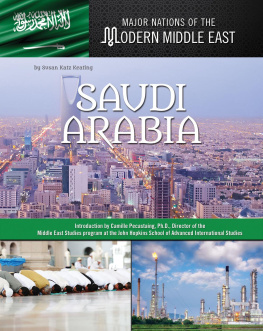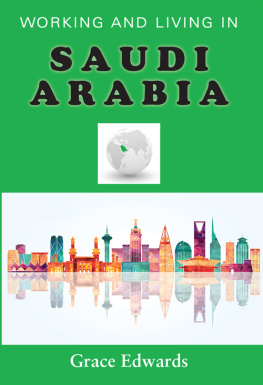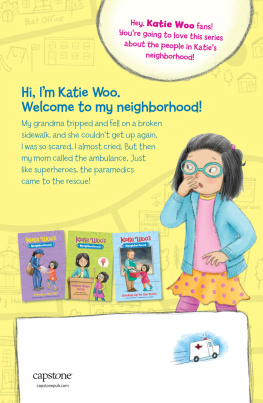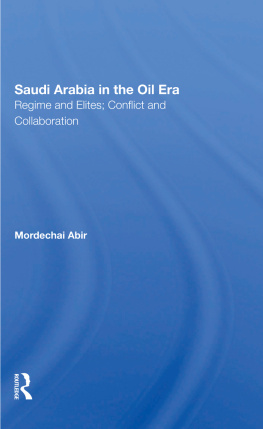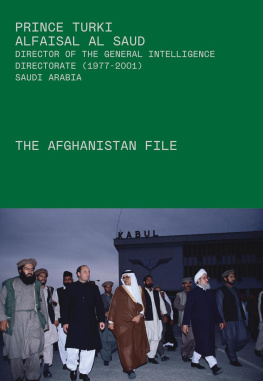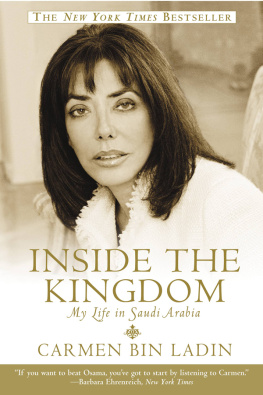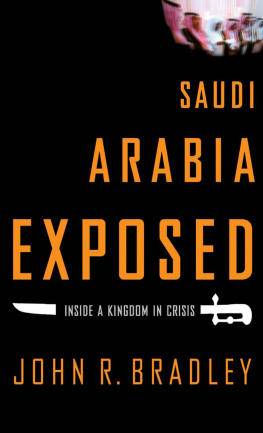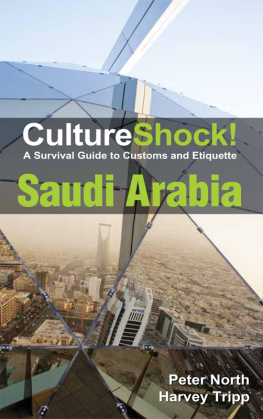
Copyright 2009 Patrick (Tom) Notestine
All rights reserved.
ISBN: 1-4392-4581-9
ISBN-13: 9781439245811
E-BOOK ISBN: 978-1-61789-164-9
Visit www.booksurge.com to order additional copies.
Paramedic to the Prince

As a journalist and observer of the human condition, Notestine is highly perceptive. Some Saudis will not be particularly flattered by the way their country comes across, but this warts and all account is never ever dull.
Daniel Bardsley, Gulf Times
Tom literally grabs you by the throat in the opening chapter. A fascinating look at contract EMS in a foreign land. An insightful look at Western Middle Eastern society and mindset. A fascinating autobiographical tale.
Norm Rooker, EMS Responder
This is one of the best books of its kind. An insight into Saudi life that most westerners would overlook.
Sandy A. Mitchell (Author), Saudi Babylon
This book is a must read and should be placed in American school libraries. So fascinating, that I got up at 3:00 am to finish it. It is raw, interesting and the emotions it stirs are intense. Made me both laugh and cry.
Theodocia Mclean, Ghost Writer Reviews
In short, it is a really interesting book and I highly recommend it.
The Anonymous Arabist
About the Author

Patrick Thomas Notestine was born in Yuba City, California. Growing up in this rural farm community, he drifted from job to job after leaving high school, working as a gas station attendant, auto-mechanic and farm laborer amongst other things. At the age of twenty-three, he took a long hard look at the direction his life was going.
At the back of his mind was a keen interest in science and medicine. Becoming an Emergency Medical Technician (EMT) seemed a good option, so he enrolled on an EMT course at his local community college. Graduating in March 1983, he found work on an ambulance in Sacramento, California. It was there working alongside a seasoned paramedic, that he found his calling in life.
He attended UCLA School for Pre-hospital Care, and in 1986, graduated as a paramedic. Living on his sailboat, he found work in the San Francisco Bay area. He started out on primary 911 response ambulances and eventually moved on to helicopter and air medical evacuation.
In 1993, the author answered an advertisement to work at a military hospital in Saudi Arabia. This is where his story begins. Working on the private medical staff of King Abdullah, he enjoyed unprecedented access to the House of Saud.
The Middle East is never far from the authors heart. He has recently taken yet another assignment working as the Emergency Medical Coordinator for a major oil company in the Persian Gulf.
Tom enjoys exploring the desert with his wife in his beat up 1985 Range Rover. His hobbies include scuba diving, rock climbing and caving.
Authors Message: I consider myself an ordinary person, who was fortunate enough to have some extra-ordinary opportunities. I hope whoever reads this book enjoys it as much as I enjoyed writing it. I believe everyone has a story to tell.
This just happens to be mine.
Patrick Thomas Notestine
This book is dedicated to:

The many healthcare professionals I have had the honor to work with over the course of my career. These professionals work selflessly to preserve and save lives. They have mentored me and taught me the true meaning of compassion and empathy.
And
My wife Pamela without her belief, encouragement and support this book would never have been published.

Contents

2001
2001

I was working in Jeddah, Saudi Arabia, in my office at the King Faisal Hospital, where I managed the ambulance service. It was late afternoon, on a Tuesday, in September 2001. I got a call from a South African guy who works in the military hospital there. He told me one of the World Trade Center towers caved in, and they blew up the Pentagon.
Huh, ri-ight .
No, he said, I swear to God.
I put down the phone, and ran into the office of the Assistant Director of the hospital, right across the corridor.
Whats going on? Whats the matter? Short fellow, dyed black hair, a real slime-ball. I correctly suspect that his job is way beyond him.
I told him Something bads happening.
I ran to his TV.
You got CNN? Turn on CNN.
We sit close and watch it, Im from California and hes from Little Rock, Arkansas. Guys start filtering in behind us through the open door. All the Saudi management, a few in western suits, but mostly in long white thobe and red checkered ghutra . On the screen theres the New York skyline, sparkling white and blue and sunny, with a vast dark cloud rising from Lower Manhattan. Theyre leaning against filing cabinets, and hunched over the backs of chairs, riveted, silent.
I look up at them, the Head of Personnel, several men from the finance department, and the rest of them, and the second plane is coming in. Live. You have never seen such broad smiles. They were joyous. It was wow, man, HIT IT. Nobody said anything.
Well the aftershock lasted a couple of hours, with everybody shaking their heads and bemoaning the carnage, and then nearly all of them left. I have a habit of saying whats on my mind.
Salman, I said to my friend, his names Salman Al Dubair, do you realize, when that second plane hit the tower, how you and Ali Bougesh were standing there grinning? It means youre happy.
Oh no, he said. We are always smiling. Its a terrible thing.
Not long afterwards Prince Naif, the Minister of the Interior and Information, explained publicly that this dreadful event had been a Jewish-American conspiracy. To single out the Saudi passengers on those planes at such short notice, as the FBI had done, was ludicrous; every one of them had been a harmless student or tourist. In the Jewish section of New York on that day, on the other hand, the Jewish community had been dancing in the streets. Not a single Jew had been killed in the World Trade Center, because they had all been warned to stay away. Four hundred Muslims had died in this conspiracy to incite hatred of Islam.
George Bush talking about a crusade really pissed them off. After that most Saudis believed that the CIA, or the FBI, or George Bush personally in collusion with Israel, was responsible for 9/11. It is the conventional wisdom among Saudis to this day, even highly educated ones.
I was talking to a smart, rich Saudi I know, who was complaining that religious education in Saudi Arabia puts a brake on scientific development. You couldnt get the students to think, he said, because theyd been taught to view the world from a religious perspective and never to ask awkward questions. The people in charge didnt want people to think they wanted a continuance of the status quo. Then 9/11 came up, as it always did for a few weeks afterwards, and he went on to tell me how exultant hed felt. He and his friends had watched the whole thing and cheered.
Because we hate Americans, he said complacently.
But not the people, of course, I said. Its like us in the Gulf, we were against the regime, we didnt hate the people.
Next page
